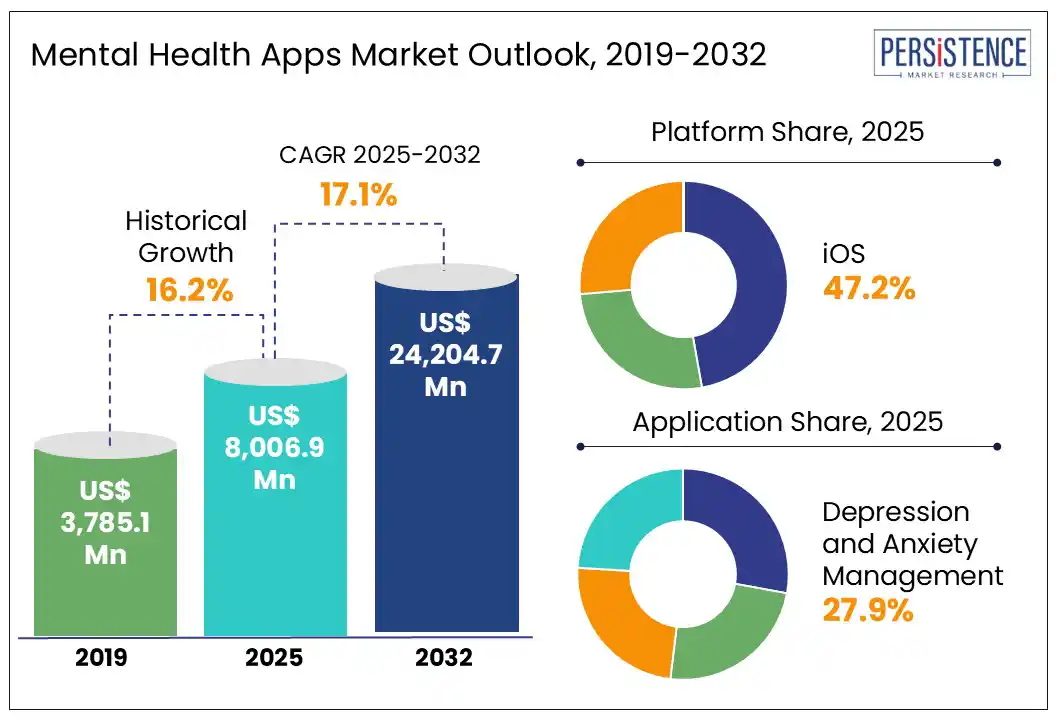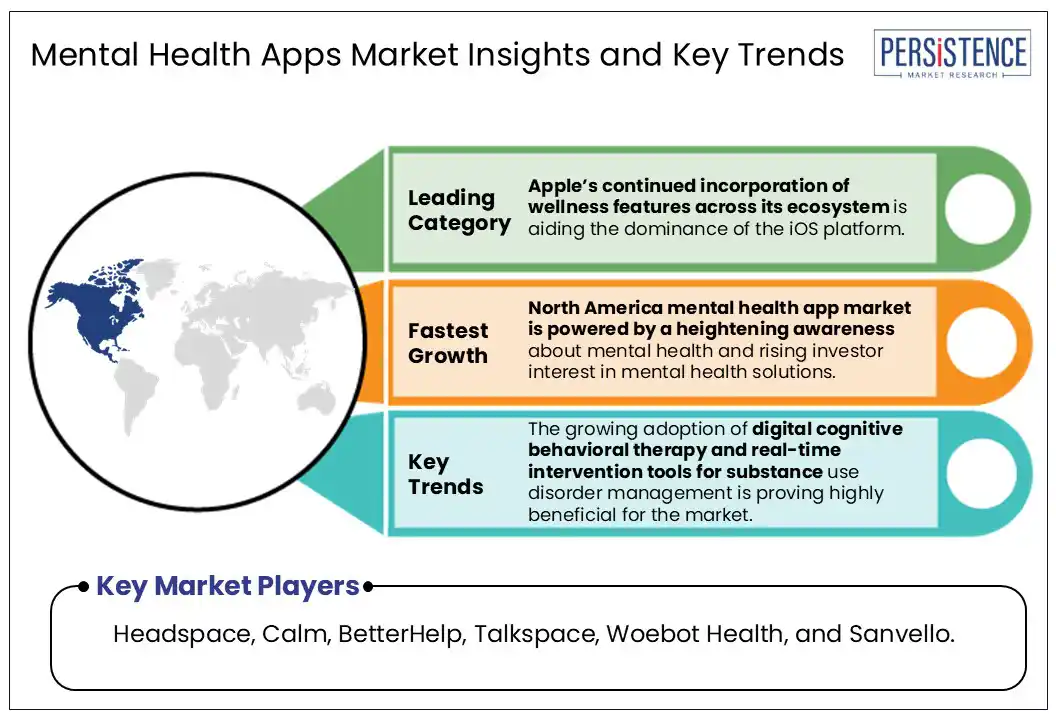ID: PMRREP32997| 195 Pages | 23 Jul 2025 | Format: PDF, Excel, PPT* | Healthcare

The global mental health apps market size is likely to be valued at US$ 8,006.9 Mn in 2025, and is estimated to reach US$ 24,204.7 Mn by 2032, growing at a CAGR of 17.1% during the forecast period 2025-2032. The mental health apps market growth is driven by rising mental health disorders, smartphone penetration, increased awareness about mental health, AI-driven personalization techniques, and expansion of telehealth services. Mental health is foundational to emotional resilience and daily functioning, and mobile mental health solutions are becoming essential tools in supporting individuals with anxiety, depression, and other psychological challenges.
The surge in anxiety and depression caused by hectic work schedules, financial issues, and, more recently, the COVID-19 pandemic, has led millions to seek virtual mental health solutions. Platforms such as BetterHelp, Calm, and Headspace witnessed over 200% annual growth in app downloads by 2021. From 2022 onward, the market for mental health apps evolved toward data-personalized emotional wellbeing options, integrating wearable technologies such as Fitbit and Apple Watch to deliver real-time mood tracking and behavioral insights. With only a small fraction of individuals receiving traditional treatment due to stigma and cost barriers, mental health apps offer accessible, evidence-based alternatives approved by regulatory bodies.

Key Industry Highlights:
|
Global Market Attribute |
Key Insights |
|
Mental Health Apps Market Size (2025E) |
US$ 8,006.9 Mn |
|
Market Value Forecast (2032F) |
US$ 24,204.7 Mn |
|
Projected Growth (CAGR 2025 to 2032) |
17.1% |
|
Historical Market Growth (CAGR 2019 to 2024) |
16.2% |
The mental health apps market outlook is evolving rapidly as platforms shift their focus from offering basic wellness tools to building comprehensive personal development ecosystems. These apps now support emotional intelligence, resilience, and peak mental performance, especially among young professionals and high achievers. Platforms such as BetterUp and Coach.me are leveraging AI and machine learning to deliver real-time emotional tracking, personalized coaching, and goal-oriented development programs.
Corporate adoption of mental health apps is rising as U.S.-based BetterUp reported a 300% surge in enterprise use of mental tools and apps. This trend reflects a growing recognition of the importance of mental health in the private sector, which in turn is boosting the demand for scalable, affordable alternatives to traditional therapy. As more organizations and individuals seek accessible mental wellness solutions, the mental health apps industry is slated to expand at a promising rate, driven by the increasing need for digital coaching and emotional support tools tailored to modern professional lifestyles.
The mental health apps market growth is facing enormous roadblocks in the form of regulatory constraints and market saturation. Stringent data protection laws such as the Digital Services Act and GDPR in the European Union (EU) are tightening requirements around user consent, AI-based therapy, and clinical claims, making compliance more complex for app developers. These regulations are determining how mental health apps operate, especially in regions with strict digital health standards.
The mental health apps domain is getting saturated further aggravating entry challenges. Already, the market is flooding with over 20,000 mental wellness apps offering similar features such as journaling, meditation, and CBT exercises. This saturation is leading to overdependence on technology, user fatigue, with studies showing that over 45% of users abandon apps within three months of download. Differentiation and regulatory alignment will therefore be critical to sustaining user engagement and long-term adoption.
Gamification is emerging as a potential growth driver in this market, as it has transformed self-therapy platforms into engaging, habit-forming tools. By integrating features such as progress tracking, reward systems, leaderboards, and feedback loops, these apps are improving user retention and making therapy more interactive. As mental health challenges rise globally, digital solutions with gamified elements are becoming essential in promoting emotional wellness and behavioral change.
Virtual reality and augmented reality are further broadening the scope of gamified mental health apps. For example, TRIPP and Limbix offer immersive environments for guided meditation and exposure therapy, showing measurable reductions in anxiety and stress. With VR-based mindfulness sessions reducing stress phobia-related anxiety by a significant margin, gamification is proving to be a powerful tool in making mental health treatment more accessible, effective, and appealing to a wider audience.
The iOS segment is expected to capture nearly 47.2% of the revenue share in 2025, fueled by Apple’s continued incorporation of wellness features across its ecosystem. Updates in iPadOS 17, iOS 17, and watchOS 10 have introduced enhanced mental health tools, including mood tracking, emotional assessments, and personalized insights, making mental wellness more accessible and integrated into daily routines.
While iOS leads in innovation, the Android segment is projected to grow steadily due to its affordability and broader reach. Android-based mental health apps offer scalable solutions for users across income levels, especially those seeking alternatives to traditional therapy. This dual-platform progression is helping mental health app developers reach diverse user groups with personalized, tech-enabled support.
Among applications, the depression and anxiety management segment is expected to account for 27.9% of the market share by 2025. The global rise in mental health conditions, including postpartum depression and general anxiety, is prompting the development of digital therapy models. Apps such as Replika, MindDoc, and Sanvello are incorporating cognitive behavioral therapy and AI to deliver personalized, evidence-based support through mood tracking, guided reflection, and interactive exercises. Stress management is also emerging as a major application area, driven by increasing burnout in academic and professional environments. With 77% of Americans reporting stress-related health issues and the World Health Organization (WHO) recognizing burnout as an occupational concern, users are turning to mobile mental health solutions for accessible, real-time relief.

North America is estimated to account for 35.6% of the market share in 2025, powered by a heightening awareness about mental health, rising investor interest in mental health solutions, and the growing need for digital therapy solutions. In the U.S., where one in five adults experiences some form of mental illness annually, the demand for mental health apps is surging. The rise in suicide rates, reported at 2.6% in 2022 by the Centers for Disease Control (CDC), has further accelerated the adoption of chatbots, crisis helplines, and app-based support platforms. However, regulatory scrutiny from the U.S. Senate and FTC has led to legal action against apps such as Cerebral for data privacy violations. In contrast, Canada is expanding access to mental health services through government-funded platforms. With an investment of US$ 240 Mn in 2022, programs such as AbilitiCBT, MindBeacon, and Wellness Together Canada are improving accessibility for underserved communities.
The mental health apps market in Latin America is undergoing a robust evolutionary phase amid crippling challenges related to economic inequality, political instability, and cultural stigma. While smartphone penetration and limited availability of traditional therapy have elevated demand, adoption remains uneven across countries in the region. Brazil, with the highest global prevalence of anxiety disorders at 9.3%, is expanding telehealth services and enabling platforms such as Vittude and Zenklub to offer virtual therapy. However, stigma in rural regions continues to hinder widespread use of mental health apps in Latin America.
In Mexico, workplace mental health platforms are gaining traction as employers prioritize holistic employee well-being. With nearly half of the workforce experiencing high stress levels, companies are integrating access to mindfulness and stress management tools such as Calm and Meditopia into their benefits programs. Such proactive efforts by the private sector are helping to normalize digital solutions and support the uptake of mental health apps across the region.
In Asia Pacific, the market is expanding at an exciting pace, with China emerging as a central hub for such platforms due to strong government backing. The active promotion of digital therapy platforms by the country’s National Health Commission and the launch of the National Psychological Aid Platform during the COVID-19 pandemic have led to a 300% surge in online therapy app adoption. This support is fostering a robust ecosystem for mental health app development in China.
India is witnessing a rise in demand for affordable, multilingual mental wellness apps such as Mindhouse, while Japan’s user engagement is being driven by gamified platforms such as Moodpath. In South Korea, government subsidies are making digital mental health solutions more accessible. These country-level efforts are collectively fueling the growth of the mental health apps market across Asia Pacific, with a focus on affordability, innovation, and inclusivity.
The global mental health apps market is becoming highly competitive, with both startups and established companies launching new platforms to amplify their reach. A growing number of developers are targeting teenagers, addressing mental health challenges linked to academic stress, family dynamics, hormonal changes, and social media pressures. A unique trend emerging in the competitive landscape of this market is the entrance of spiritual leaders and organizations into the mental health apps space. Meanwhile, insurance providers are also offering free access to in-house mental health platforms to policyholders, creating new growth avenues for the market.
The market is projected to reach US$ 8,006.9 Mn in 2025.
Growing recognition of the importance of mental health in the private sector is driving the market.
The market is poised to witness a CAGR of 17.1% from 2025 to 2032.
The integration of digital mental health solutions with gamified elements and the inclusion of AR and VR technologies in mental health apps are key market opportunities.
Headscape, Calm, and BetterHelp are some of the key players in the market.
|
Report Attribute |
Details |
|
Historical Data/Actuals |
2019 - 2024 |
|
Forecast Period |
2025 - 2032 |
|
Market Analysis |
Value: US$ Mn |
|
Geographical Coverage |
|
|
Segmental Coverage |
|
|
Competitive Analysis |
|
|
Report Highlights |
|
|
Customization and Pricing |
Available upon request |
By Platform
By Application
By Subscription Model
By Region
Delivery Timelines
For more information on this report and its delivery timelines please get in touch with our sales team.
About Author